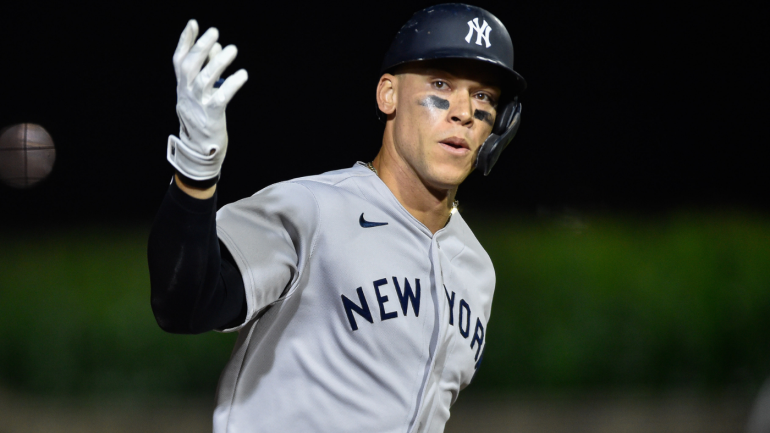
Tuesday was an important date on the baseball calendar. It was the deadline for teams and their arbitration-eligible players to submit salary figures for the 2022 season. The filing deadline was originally scheduled for Jan. 14, though that didn't happen because of the owner-imposed lockout. The deadline was moved to March 22 once the lockout ended.
In a normal offseason, the vast majority of arbitration-eligible players sign a one-year contract for the coming season prior to the filing deadline. Only a handful actually file, and even fewer go to an arbitration hearing. Arbitration hearings will take place during the regular season this year. It's awkward, but it has been done before (after the players' strike in 1995).
Hearings can be done during the season if need be; player would be paid the rate of the club filing number and then made good if he wins the case
— Rod Blunck (@rodblunck) March 10, 2022
Players who do not agree to a contract prior to the filing deadline file the salary they believe they should be paid in the coming season, while the team files the salary they believe the player should be paid. If the two sides go to a hearing, the three-person arbitration panel will choose either the salary the player filed or the salary the team filed. Nothing in-between.
Close to 200 arbitration-eligible players were unsigned coming out of the lockout. It's important to note that although the two sides can discuss and agree to a contract of any size after the filing deadline, many clubs use a "file and trial" approach, meaning once they file salary figures, they cut off contract talks and go to a hearing. It is intended to put pressure on the player to sign quickly.
Here is everything you need to know following Tuesday's 1 p.m. ET arbitration salary filing deadline.
Judge, Yankees far apart
The Yankees and their star outfielder Aaron Judge have filed, and they're not particularly close on his 2022 salary:
Aaron Judge filed for $21 million, while the Yankees filed at $17 million, per source.
— Mark Feinsand (@Feinsand) March 23, 2022
Judge, who turns 30 in late April, is third-year arbitration-eligible and slated for free agency next offseason. He's coming off a strong 2021 campaign in which he batted .287/.373/.544 with 39 home runs in 148 games and a WAR of 6.0. Those are quite obviously strong numbers, and Judge also logged his most games played since 2017.
Nationals reach deal with Soto
The Nationals did not reach a contract agreement with Juan Soto prior to the filing deadline, but they did strike a one-year agreement worth $17.1 million in the hours thereafter. Josh Bell also agreed to a one-year deal of his own, albeit worth $10 million.
Soto had been entering his second season of arbitration-eligibility as a Super Two, meaning his service time allowed him to go through the arbitration process four times rather than the usual three. The record salary for a player in his second year of arbitration as a Super Two is Nolan Arenado's $17.75 million salary in 2018.
Washington tried to lock up Soto long-term prior to the lockout, though he passed up their 13-year offer worth $350 million. The Nationals will undoubtedly continue to try to sign Soto to a long-term deal, though at some point they will have to shift their focus to 2022 and simply get him under contract for this season.
Braves going to hearings with several key players
The defending World Series champion Braves are heading to arbitration hearings with five key members of last year's squad, according to MLB Network's Jon Heyman: outfielder Adam Duvall, lefty Max Fried, righty Luke Jackson, third baseman Austin Riley, and shortstop Dansby Swanson. Atlanta did reach deals with lefties AJ Minter, Tyler Matzek, and Sean Newcomb.
Heyman notes the Braves are a "file and trial" team, so they are cutting off contract talks with their unsigned players and will go to a hearing. Arbitration hearings can be contentious, the team details the player's shortcomings and explains why he deserves to be paid less than he believes, though both sides understand this is a business. Any bad feelings that develop are usually short-term.
Elsewhere, both Nicky Lopez and Andrew Benintendi of the Royals will be heading to arbitration hearings with Kansas City, according to MLB.com's Mark Feinsand.
Chapman, others agree to short-term extensions
The Rockies beat the rush and signed third baseman Ryan McMahon to a six-year, $70 million contract earlier this week. McMahon was arbitration-eligible and two years away from free agency. There's always a handful of contract extensions in spring training and a few multi-year deals were signed before the filing deadline. Here are the notables:
LHP Richard Bleier, Marlins: 2 years, $6 million, per team announcement. The contract also includes a club option for a third year. Bleier, a veteran ground ball machine out of the bullpen, was scheduled to become a free agent after 2022. The contract buys out one free agent year with a club option for a second.
3B Matt Chapman, Blue Jays: 2 years, $25 million, per ESPN's Jeff Passan. Acquired from the A's last week, Chapman's two-year deal buys out his last two years of arbitration-eligibility. It does not delay his free agency. The contract gives him a nice guaranteed payday and the Blue Jays cost certainty over his remaining two years of team control.
1B/OF Darin Ruf, Giants: 2 years, $6.25 million, per ESPN's Jeff Passan. Since returning from Korea two years ago, Ruf has carved out a role as a lefty mashing platoon bat. The two-year deal buys out his two remaining years of arbitration-eligibility.
Notable one-year deals
Here are some notable players who reportedly agreed to standard one-year deals to avoid arbitration:
- Shane Bieber, Guardians ($6 million)
- Trea Turner, Dodgers ($21 million)
- Julio Urías, Dodgers ($8 million)
- Joey Gallo, Yankees ($10.3 million)
- Vladimir Guerrero Jr., Blue Jays ($7.9 million)
- Edwin Díaz, Mets ($10.2 million)
- Corbin Burnes, Brewers ($6.5 million)
- Brandon Woodruff, Brewers ($6.8 million)
- Gleyber Torres, Yankees ($6.25 million)
- Rhys Hoskins, Phillies ($7.7 million)
- Tyler Glasnow, Rays ($5.1 million)
- Jack Flaherty, Cardinals ($5 million)
- Joe Musgrove, Padres ($8.625 million)
- Rafael Devers, Red Sox ($11.2 million)
- Pete Alonso, Mets ($7.4 million)
- Sean Manaea, Athletics ($9.75 million)
- Frankie Montas, Athletics ($5.02 million)





























